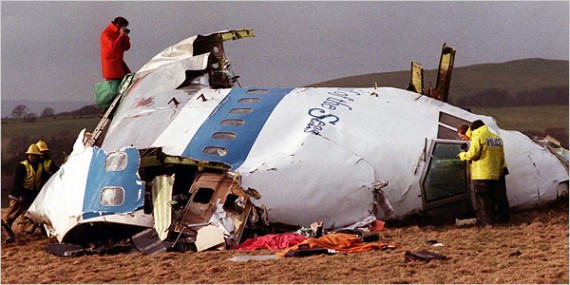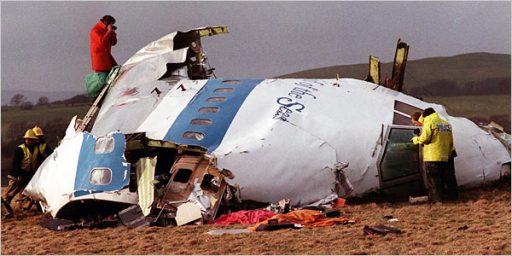Did BP Help Get Lockerbie Bomber Released From Prison ?
As if the Gulf Oil Spill weren't enough, there are now allegations that BP played a role in the release of the only man convicted in the murder of 190 Americans.
There’s been increasing speculation over the past several days that BP may have played a role in last year’s release of the only person convicted in the bombing of Pan Am Flight 103 over Lockerbie, Scotland:
LONDON — The oil giant BP faced a new furor on Thursday as it confirmed that it had lobbied the British government to conclude a prisoner-transfer agreement that the Libyan government wanted to secure the release of the only person ever convicted for the 1988 Lockerbie airliner bombing over Scotland, which killed 270 people, most of them Americans.
The admission came after American legislators, grappling with the controversy over the company’s disastrous Gulf of Mexico oil spill, called for an investigation into BP’s actions in the case of the freed man, Abdel Basset Ali al-Megrahi.
The former Libyan intelligence agent was released and allowed to return to Libya last August after doctors advised the Scottish government that he was likely to die within three months of advanced prostate cancer. But nearly a year later, he remains alive, and free, in the Libyan capital, Tripoli.
BP’s statement on Thursday repeated earlier acknowledgments that it had promoted the transfer agreement to protect a $900 million offshore oil-and-gas exploration deal off Libya’s Mediterranean coast. The British justice minister at the time, Jack Straw, admitted shortly after Mr. Megrahi was repatriated and freed that the BP deal was a consideration in the government’s review of his case.
In the end, Mr. Megrahi was not released under the prisoner transfer agreement. Instead, to the consternation of the Obama administration, and of many of the victims’ families, the Scottish government released him in August 2009 under provisions in Scottish law that allow for a prisoner’s sentence to be commuted on humanitarian grounds, because Mr. Megrahi had terminal prostate cancer. That freed him from serving any further prison time in Libya, as he would have had to do under the transfer pact.
(…)
BP’s business dealings in Libya include an exploration deal in the Gulf of Sidra and others in the western desert, which the company estimates could lead to an eventual BP investment of up to $20 billion. The deals represent BP’s return to Libya after decades of exclusion that followed nationalization of the company’s interests there in the 1970s.
(…)
“It’s not for BP to comment on the decision of the Scottish government,” the BP statement said. “BP was not involved in any discussion with the U.K. government or the Scottish government about the release of Mr. al-Megrahi.”
But the company’s critics have said that such a distinction was largely illusory, since Libya’s pressure for the prisoner transfer pact was primarily motivated, as Libyan officials said at the time, by their desire to bring Mr. Megrahi home.
This news comes only a week after we learned that the medical evidence used to support al-Megrahi’s compassionate release was essentially false.
The role of the Libyan oil deal in the release isn’t exactly a secret, though, we were hearing similar allegations when al-Megrahi was released last year:
The British government decided it was “in the overwhelming interests of the United Kingdom” to make Abdelbaset Ali Mohmed al-Megrahi, the Lockerbie bomber, eligible for return to Libya, leaked ministerial letters reveal.
Gordon Brown’s government made the decision after discussions between Libya and BP over a multi-million-pound oil exploration deal had hit difficulties. These were resolved soon afterwards.
The letters were sent two years ago by Jack Straw, the justice secretary, to Kenny MacAskill, his counterpart in Scotland, who has been widely criticised for taking the formal decision to permit Megrahi’s release.
The correspondence makes it plain that the key decision to include Megrahi in a deal with Libya to allow prisoners to return home was, in fact, taken in London for British national interests
And, specifically, the interests of BP.
If nothing else, this revelation makes the decision to release al-Megrahi all the more outrageous and further solidifies the reputation of BP as perhaps the most reviled corporation in American history.
There really isn’t anything that the United States can do about this at this point, of course, but it would seem to be useful for the truth to come out here.






“further solidifies the reputation of BP as perhaps the most reviled corporation in American history.”
Succumbing to a bit of hyperbole here aren’t we Doug. There are plenty of other candidates. It’s not as if corporations aren’t doing this sort of wheel greasing all the time. They protect their own interests. It’s called free enterprise.
I wonder if BP gave their money to Obama to ensure he would sign off on the release of this terrorist as he then did ?
Technically the “perhaps” disqualifies Doug’s statement from being hyperbole. That just leaves you room to offer your own “perhaps,” as in “Perhaps RJ Reynolds is actually the country’s most reviled corporations in American history.”
It’s a discussion technique.
It’s called free enterprise aka the amoral pursuit of profit regardless of human consequences.
“It’s called free enterprise aka the amoral pursuit of profit regardless of human consequences.”
The problem is you don’t get sausages without killing pigs . Business, particularly when it involves multinational corporations, has a seamy side. As we’re all discovering the Roman Catholic church has a seamy side so expecting big companies to be squeaky clean veers between naive and obtuse. American tobacco companies conned the American people for generations causing addiction, sickness and death for millions. You want to get outraged Doug? well get outraged with them because what they did makes BP’s transgressions look pretty minor. Or how about the thalidomide cover up? Spare me the humbug because that’s what it is.
“I wonder if BP gave their money to Obama to ensure he would sign off on the release of this terrorist as he then did ?”
And needless to say we have the usual big thinker who believes it’s all Obama’s fault ho ho.
“Business, particularly when it involves multinational corporations, has a seamy side.”
Hardly an excuse to look the other way, and certainly no excuse for acceptance.
“American tobacco companies conned the American people for generations causing addiction, sickness and death for millions.”
Tobacco companies conned the willing. Mom knew it was bad for me back in the fifties, and she was practically Edith Bunker. To this day very few committed smokers whine until they come down with something.
It’s one thing to understand that profit has no conscience and quite another to think of it as natural and immutable.
The problem is you don’t get sausages without killing pigs .
True, but when sausage-makers start to kill _people_ to make sausage, it’s a different story altogether. Just because it’s cheaper to simply fake those bothersome health inspections doesn’t mean the additional profit generated is a good end unto itself.
What a despicably amoral way to try and wash your hands of evil.
I see things a bit more broadly. If democracy didn’t lend itself to discretionary policies and we instead relied on rules then we wouldn’t be having this issue.
No, its called corporatism. Free enterprise means merely that one is free to engage in economic transactions. This on the other hand is rent seeking and is only possible where the government can be influenced…either by corporations or individuals.
“Tobacco companies conned the willing. Mom knew it was bad for me back in the fifties, and she was practically Edith Bunker.”
What are you talking about? For decades the tobacco companies denied there was any link between cancer, emphysema and a host of other conditions. They had armies of ad agencies, PR companies, fake front organisation engaged in what was basically a criminal conspiracy.
……………
“It’s called free enterprise.
No, its called corporatism. ”
There’s no difference in practice
………….
“What a despicably amoral way to try and wash your hands of evil.”
Ever seen a pig killed? It isn’t pretty. I’m not washing my hands of anything, just recognizing reality. Your problem is you want all the benefits of modern industrial society but just want to pretend it hasn’t a dark side. By comparison with a lot of incidents in US industrial history BP’s errors are relatively minor but don’t let me interrupt you bout of self righteousness.
So to have all the benefits of modern industrial society, we have to accept that a corporation can help to release a terrorist responsible for the deaths of hundreds of people? Some tradeoff…a pity Osama bin Laden didn’t get into bed with some multinational…perhaps he might have gotten better terms to come out of the shadows…
Doug – Don’t you think your vilifying of business is basically anti-American? Careful, they might take away your Glenn Beck secret decoder ring 🙂
I said it once and I will say it again-the evidence against the defendant was weak. Instead of you’al getting your panties in bunches why don’t we wait for all the facts.
Nope, in fact, it´s more complicated. Silvio Berlusconi has Kadafi as his one of his closest friends among statesmen, some years ago Sarkozy even promised a nuclear reactor to him. The fact is that many Europeans leaders wants Kadafi as his friend because of natural gas, since Putin uses Gazprom to blackmail the continent.
The real problem of Megrahi is that the evidence against the Lybians was weak – the fact that they found Semtex in the wreckrage, while people both on the political left and right seems to believe that Abu Nidal or the Iranians that bombed that plane. In fact, probably, the Scots were also afraid of some revision of the trial.
Your problem is you want all the benefits of modern industrial society but just want to pretend it hasn’t a dark side.
I strongly disagree with this. I simply require limits on industry and its ‘dark side’ – and I fully accept that this may also limit the complimentary ‘light side’ some. You sound more like you want some sort of acceptance or blessing of valuing monetary gain higher than human life, and you won’t get it from me.
@Brum-Joe
“What are you talking about? For decades the tobacco companies denied there was any link between cancer, emphysema and a host of other conditions. They had armies of ad agencies, PR companies, fake front organisation engaged in what was basically a criminal conspiracy.”
I did not say that they did not do those things. I said that only dumba$$e$ and those willing to suspend disbelief for their own convenience believed the tobacco industry crap.
“I’m not washing my hands of anything…”
That’s exactly what you are doing-“oh well, it just is, accept it.”
Look up the big words if you need to, so you won’t look silly responding to that which isn’t there.
“I did not say that they did not do those things. I said that only dumba$$e$ and those willing to suspend disbelief for their own convenience believed the tobacco industry crap.”
So your blaming the victims for the tobacco industry con, nothing to do with the perps. So it was fine for Enron or Madoff to practise fraud because the victims were dumbasses who got what they deserved just like those who believed the tobacco industry’s bs.
” You sound more like you want some sort of acceptance or blessing of valuing monetary gain higher than human life, and you won’t get it from me.”
No, I’m just facing the reality that corporations are not squeaky clean because they are basicaly in the business of making money. Even ones that are doing all kinds of good like the drug industry often behave in a less than ethical way as for example over Avandia, and oil companies certainly do because they are in business that is phenomenally dirty, literally and figuratively.
@Steve V.
“No, its called corporatism.”
Do we have any evidence at all, from anywhere in the modern era (say, from 1890 on), that a capitalist economic system does not end in corporatism, and that is is really a bug and not a feature?